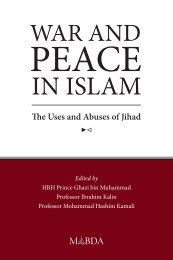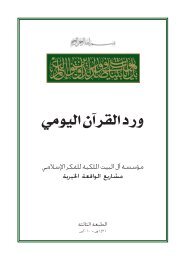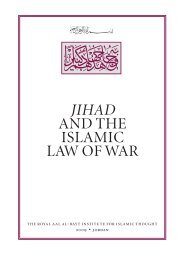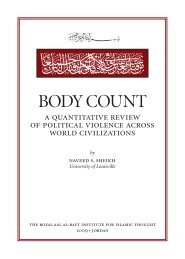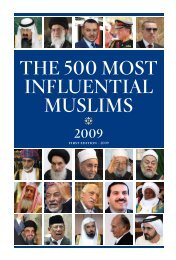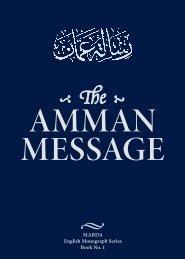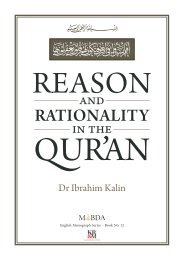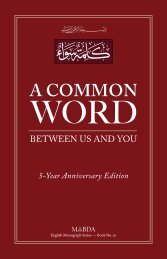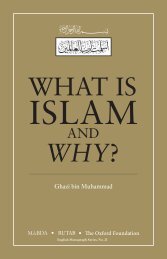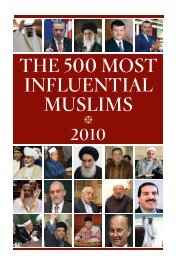Al-W¥^idÏ's Asb¥b al-Nuz‰l - The Royal Islamic Strategic Studies ...
Al-W¥^idÏ's Asb¥b al-Nuz‰l - The Royal Islamic Strategic Studies ...
Al-W¥^idÏ's Asb¥b al-Nuz‰l - The Royal Islamic Strategic Studies ...
You also want an ePaper? Increase the reach of your titles
YUMPU automatically turns print PDFs into web optimized ePapers that Google loves.
Chapter 15: Surah <strong>al</strong>-Hijr<br />
In the name of <strong>Al</strong>lah, the Beneficent, the Merciful.<br />
(And verily We know the eager among you and verily We know the laggards) [15:24].<br />
Nasr ibn Abi Nasr <strong>al</strong>-Wa‘iz informed us> Abu Sa‘id ‘Abd <strong>Al</strong>lah ibn Muhammad ibn Nusayr <strong>al</strong>-Razi> Muhammad<br />
ibn Ayyub <strong>al</strong>-Razi> Sa‘id ibn Mansur> Nuh ibn Qays <strong>al</strong>-Tahi> ‘Amr ibn M<strong>al</strong>ik> Abu’l-Jawza’><br />
Ibn ‘Abbas who said: “A beautiful woman used to pray behind the Prophet, <strong>Al</strong>lah bless him and give him<br />
peace, but she used to stand in prayer behind <strong>al</strong>l the women present. Some people used to proceed to the<br />
first row so as not to see her. Others, on the other hand, used to pray in the last row on purpose, such<br />
that, upon bowing, they caught a glimpse behind them [trying to see that woman]. And so, this verse was<br />
reve<strong>al</strong>ed (And verily We know the eager among you and verily We know the laggards)”. 1<br />
<strong>Al</strong>-Rabi‘ ibn Anas said: “<strong>The</strong> Messenger of <strong>Al</strong>lah, <strong>Al</strong>lah bless him and give him peace, encouraged people<br />
to pray in the first row and, as a result, people jostled with each other for a place at the first row. <strong>The</strong><br />
houses of Banu ‘Udhrah were very far from the mosque and so they said: ‘Let us sell our houses and buy<br />
houses close to the mosque’. <strong>The</strong>n, <strong>Al</strong>lah, ex<strong>al</strong>ted is He, reve<strong>al</strong>ed this verse”.<br />
(And We remove whatever rancour may be in their breasts…) [15:47].<br />
‘Abd <strong>al</strong>-Rahman ibn Hamdan <strong>al</strong>-‘Adl informed us> Ahmad ibn Ja‘far ibn M<strong>al</strong>ik> ‘Abd <strong>Al</strong>lah ibn Ahmad<br />
ibn Hanb<strong>al</strong>> Muhammad ibn Sulayman ibn Kh<strong>al</strong>id <strong>al</strong>-Fahham> ‘<strong>Al</strong>i ibn Hashim> Kathir <strong>al</strong>-Nawwa’ who<br />
said: “I said to Abu Ja‘far: ‘So-and-so related to me that he related from ‘<strong>Al</strong>i ibn <strong>al</strong>-Husayn, may <strong>Al</strong>lah<br />
be pleased with father and son, that this verse was reve<strong>al</strong>ed about Abu Bakr, ‘Umar and ‘<strong>Al</strong>i, may <strong>Al</strong>lah<br />
be well pleased with them (And We remove whatever rancour may be in their breasts. As brethren, face to<br />
face, (they rest) on couches raised)’. He said: ‘By <strong>Al</strong>lah, it was reve<strong>al</strong>ed about them; and about whom else<br />
would it be reve<strong>al</strong>ed if not about them’. I asked: ‘What rancour is that which is referred to here’ He said:<br />
‘<strong>The</strong> rancour of the time of ignorance; there was rancour between the Banu Taym, the Banu ‘Adiyy and<br />
the Banu Hashim during the period of ignorance. When these people embraced Islam, they loved each<br />
other. In one occasion, Abu Bakr had pain in his waist, so ‘<strong>Al</strong>i warmed his hand and applied it on Abu<br />
Bakr’s waist. This verse was then reve<strong>al</strong>ed’ ”. 2<br />
(Announce, (O Muhammad) unto My slaves that verily I am the Forgiving, the Merciful…)<br />
[15:49].<br />
Ibn <strong>al</strong>-Mubarak reported through his chain of transmission from a Companion of the Prophet, <strong>Al</strong>lah<br />
bless him and give him peace, that he said: “<strong>The</strong> Messenger of <strong>Al</strong>lah, <strong>Al</strong>lah bless him and give him peace,<br />
came out to us from the door which the Banu Shaybah use and found us laughing. He said: ‘I see that<br />
you are laughing!’ He retreated but when he reached the buttress, he came back to us and said: ‘When I<br />
left, Gabriel, peace be upon him, came to me and said: ‘O Muhammad, <strong>Al</strong>lah, glorious and majestic is<br />
He, says: Why are you driving my servants to despair (Announce, (O Muhammad) unto My slaves that<br />
verily I am the Forgiving, the Merciful)’ ’ ”. 3<br />
1<br />
Tabari, :26; Durr, :73. Ibn Kathir was of the opinion that this report is weak and thought that the words were those of Ibn<br />
<strong>al</strong>-Jawza’ rather than those of Ibn ‘Abbas. <strong>Al</strong>-Nasa’i and <strong>al</strong>-Tirmidhi narrated this same saying from Ibn <strong>al</strong>-Jawza’ and did not link<br />
it to Ibn ‘Abbas.<br />
2<br />
Tabari, :37-38; Durr, :85.<br />
3<br />
Tabari, :39; Qurtubi, :34; Durr, :86.



